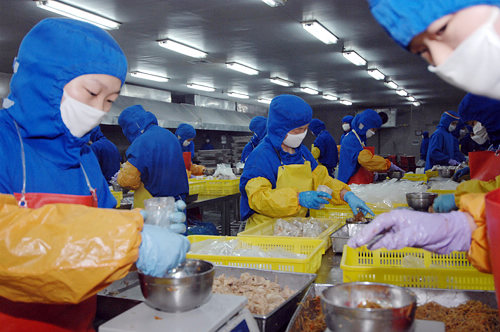|
 |
|
HIGH QUALITY: A food company in east China's Shandong Province is preparing products bound for Japan (XINHUA) |
The Chinese Academy of Social Sciences issued a blue paper on industry, the Annual Report on Industrial Competitiveness of China, on December 12. According to World Bank's 2011 standard, China is already an upper middle-income country. The World Bank puts countries whose per-capita annual income between $3,856 and $11,905 as upper middle-income countries. According to the National Bureau of Statistics, China's per-capita income for 2010 stood at $ 4,277.
Statistically speaking, it's true that China is an upper middle-income country. However, we must not forget one thing. The Gini Coefficient, which is a measurement of the gap between the rich and the poor in a country, warns that when the number surpasses 0.4, the gap is already very large and social stability is in danger. The Gini Coefficient in China is now 0.53, and is still growing.
That's why although China is already labeled as an upper middle-income country, we can't neglect the 150 million people who are still living in extreme poverty and the 230 million migrant workers who have no access to basic social security and welfare. These statistics tell that the country's overall wealth does not necessarily represent ordinary families' living conditions. Besides, although China's annual per-capita GDP has surpassed $4,000, the per-capita disposable income is far from $2,000. Half of the country's GDP does not benefit the ordinary people.
A country's real national strength depends on the public's overall living conditions, not the small group at the top.
Yanzhao Evening News
According to the white paper China's Foreign Trade, issued by the State Council, the quality of China's exports is improving on the whole. In 2010, the pass rate of exports to the United States reached 99.5 percent while those to the EU hit 99.8 percent and to Japan reached 99.7 percent. The Japanese food authorities spot-checked 20 percent of food imported from China, and the pass rate was 99.74 percent.
The high pass rate of exported food composes a striking contrast to dangerous food in China. Some food even can't reach the bottom line of edibility. China's dairy products, for example, are deteriorating.
Many countries have strict criteria for food safety, particularly for imported food. If you fail to meet their quality standards, your exports are not allowed in. Once a certain kind of food is discovered deficient in quality, a ban will fall on the import of this food, and even relevant products will be banned. As a result, Chinese food producers have to work carefully, while food inspection authorities also begin to strengthen supervision.
The high pass rate of exported food proves that Chinese businesses are able to produce safe food and food watchdogs are able to ensure food safety. The quality of food products in the domestic market should be as good as those exported. The key is a stricter food safety criteria and strong determination to safeguard the public's health.
Changjiang Daily
The Education Ministry of China recently published the result of a study on college student employment. According to the study colleges are not vocational or technical schools, and thus employment rate should not be used as the only guideline for colleges' subject design.
The result of the study reminded people of a statement of the Ministry of Education, which demands colleges reduce recruitment of subjects that see employment rate lower than 60 percent for two years consecutively. These subjects might finally be canceled.
It's understandable for the ministry to suggest the direct link between employment rate and college subject design. But, deciding a subject's fate by solely referring to the employment rate seems somewhat unreasonable. Actually, graduates from prestigious universities can always find satisfactory jobs, no matter what major they are in, while those from common universities always have difficulty finding a job.
More importantly, if low employment rate subjects are all cut, we'll see the disappearance of humanities and basic science subjects in key universities, making it impossible for some key scientific research to go on.
Employment rate is very important, but an overemphasis on it will do harm to a college's sound development, and is not in the interest of students.
Guangming Daily
Growing evidence shows that primary and middle school students in China are sleeping less and less in recent years, with 80 percent of them lacking sleep.
According to the Guide of Health Education in Primary and Middle Schools issued by the Education Ministry, primary school students should sleep 10 hours a day, junior and senior middle school students should sleep at least 9 and 8 hours a day. However, the China Youth & Children Research Center's survey in 2010 showed that students' actual sleep time is much less.
A forum on children's healthy and happy growth was held in Beijing on December 11. Education departments organized the forum in order to find out why students are so heavily burdened and come up with ways to deal with the situation.
The importance of relieving children from heavy academic burdens is obvious, but despite repeated calls from education departments to reduce pressure on students, schools will never give in when it comes to how many students can enter higher schools.
Thus, the key is not numerous orders to alleviate burdens on students, but a new education performance measurement mechanism to tangibly liberate children from academic pressure and enjoy more sleep.
Xi'an Evening News | 